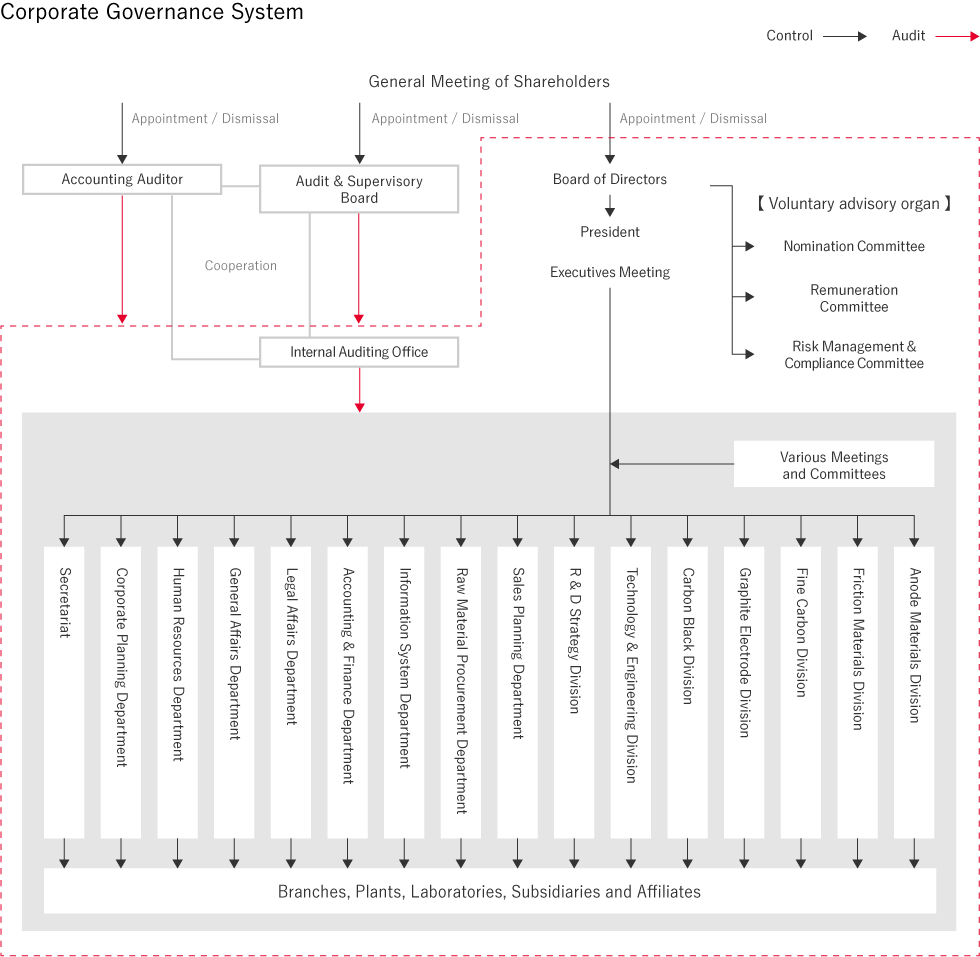Governance
Tokai Carbon recognizes that enhancing mid- to long-term corporate value is the most important management objective. We believe that responding to the expectations of all stakeholders, including customers and shareholders, and building favorable relationships, is essential in achieving this objective. To this end, we embrace the corporate philosophy of Ties of Reliability. Through this philosophy and through the policies and values outlined in our Guidelines and Corporate Code of Ethics, we are working to develop an effective corporate governance structure.
Corporate Governance System
Tokai Carbon Corporate Governance Structure
Scroll horizontally to view the whole table

Board of Directors
The Board of Directors is responsible for determining important management matters and supervising business execution and meets monthly as a general rule. As of the date of submission of this report, there are seven (7) Directors two (2) of whom are External Directors. The Company has established the Nomination Committee and the Remuneration Committee, the majority of members of which are External Directors, as voluntary advisory organs of the Board of Directors, It has also established the Risk Management & Compliance Committee as a voluntary committee under the Board of Directors.
Audit & Supervisory Board Members and the Audit &Supervisory Board
The Audit & Supervisory Board of the Company meets monthly as a general rule. As of the date of submission of this report, there are four (4) Audit & Supervisory Board Members two (2) of whom are External Audit & Supervisory Board Members. Based on the auditing policy and the audit plan resolved by the Audit & Supervisory Board, Audit & Supervisory Board Members perform audits of the status of execution of duties by Directors through attending meeting of the Board of Directors and other important meetings and investigating the status of business operations and assets.
Business execution
The Management Committee was established under the Board of Directors to discuss and determine important matters concerning management based on the basic policies determined by the Board of Directors. Under the Management Committee are various committees that complement the discussions of the Management Committee by reporting the results of deliberation to the Management Committee. Furthermore, the Company adopts the Executive Officer System under which the Board of Directors selects twelve (12) Executive Officers who are accountable for business execution.
Internal audits and accounting audits
The Company has established an Internal Auditing Office to serve as an internal auditing department. The Internal Auditing Office is in charge of improving and enhancing the internal control systems by performing internal audits on business operations of the Company and each Group company. The Internal Auditing Office ensures it follows up on audits performed to see that recommendations for improvement have been implemented. Important audit results are reported to the Board of Directors.
The Company has a contract in place with the accounting audit firm Deloitte Touche Tohmatsu LLC regarding accounting audits pursuant to Japan’s Companies Act and Financial Instruments and Exchange Act. The Accounting Auditors audit the account statements and financial statements from the standpoint of an independent third party and report the results of the audit to the Company. Appropriate opinions on reviews and issues of internal control systems, etc. are then exchanged, and improvements are implemented in accordance with recommendations. The Company also submits information and data to the Accounting Auditors in order to ensure an environment in which audits can be carried out swiftly and accurately. There are no special conflicts of interest between the Company and the aforesaid accounting audit firm and executive members of the said accounting audit firm who perform audits of the Company.

